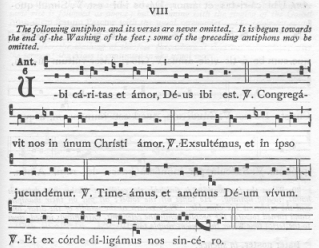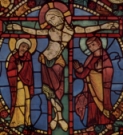Article 2: «Ubi caritas et amor» :
what does this Hymn mean?

This latin
text1
used to be always sung at the
«Washing of the feet» part of the Solemn Evening Mass
of Maunday Thursday. Here is my translation:
Antiphon Where are love and charity, there God is.
Verse Christ's love assembles us as one.
Verse Let us exult, and rejoice in him.
Verse Let us fear and love the living God.
Verse And from a sincere heart let us love each other.
I do not know when this Hymn was first sung, but its
message is very close to the Gospel's. This Hymn says that
God is love and that we find Him everywhere we find love,
charity and the service of the other.
By washing His disciples' feet,
Jesus showed He was their Servant.
He also told them to do likewise.
This message also comes out in John's first Epistle:
«Beloved, let us love one another: for love is of God; and
every one that loveth is born of God, and knoweth God.
He that loveth not knoweth not God; for
God is love.»2
Let us assume for one moment that this last text's
author is right. What does it imply? What does this text
really says? It not only says that the child of God is a loving,
caring, self-giving individual but also that any loving, caring,
self-giving individual is a child of God, whether she recognizes
herself as such or whether others recognize her as such.
Another way to say the same thing is that the way we can tell
if someone is of God is if she is loving, caring, self-giving,
a servant to all. This is how everyone knows that Mother
Theresa is of God, is a saint.
If this love exists between partners, God is in their union,
because «love is of God». It does not matter if the partners
are legally or religiously married or not, of different sexes or
not, as long as this love, this self-giving, this service to the
other, is well and truly present. Because, as John so aptly
puts it, love is from God.
Hate on the other hand, hate of those who are
seen as different for any reason, is not of God.
Considering loving couples as evil because their
members are gays or lesbians, divorced or unwed, this is
not of God; as John so aptly put it: «He that loveth not
knoweth not God; for God is love.».
So as Catholic Christians, children of God,
we do not have a choice in our conduct: we are to love
the others, even when they are different; we have to
rejoice in the fact that their union is just as holy as the
ones between spouses of the opposite sex in a «regular
Catholic marriage» as long as it is one of true love and service.
Solemnity of the Sacred Heart, June 18th, 2004.
1 Antiphon
Ubi caritas et amor, Deus ibi est.
Versum Congregavit nos in unum Christi amor.
Versum Exsultemus, et in ipsi jucundemur.
Versum Timeamus, et amemus Deum vivum.
Versum Et ex corde diligamus nos sincero.
The Liber Usualis , page 675.
Desclée Company, Tournai (Belgium) - New York N.Y., 1961
2 1 John 4: 7-8;
from the King James Version
To Top
To Next Article
Solemnity of the Most Holy Trinity, June 6th, 2004
© 2004 Jacques Beaulieu - property of Jacques Beaulieu - All rights reserved:
Any text on this website can be freely copied if then freely distributed
«freely ye have
received, freely give.» (Matthew 10:8b)
Comment via e-mail to the author

